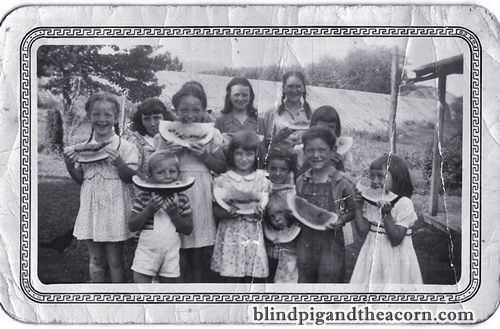
“I haven’t used the word “compatriot” in a long time, but it used to be common among those in Choestoe (“the place where rabbits dance”) as those with Scots-Irish ancestors settled the hills and hollows (only we called them hollers) of that Appalachian Region. Webster defines “compatriot” as “a person born, residing, or holding citizenship in the same country as another.” And when we think about it, even if we move out from the homeplace, we still hold that compatriotism–a tie that binds heart to heart, place to place, custom to custom, life to life.”
—Ethelene Dyer Jones – 2015
Pap used the word compatriot to describe friends and close acquaintances.
Subscribe for FREE and get a daily dose of Appalachia in your inbox


I don’t recall hearing compatriot used. When I had been out and about with some of my friends Dad would ask, “What mischief have you and your cohorts been up to?” I guess he felt we were always doing something illegal or immoral. We probably were most of the time. If it wasn’t dangerous it usually wasn’t much fun.
A lot of this is new to me but I enjoy reading and learning thru your posts…Tks for this.
Compatriot isn’t a word I’ve often heard and I think I’ve only used it in a joking sort of way, such as, “he was my compatriot in crime.”
I haven’t heard this in a long time. I dont use it. My dad and mom did.
I use that word often. I see a compatriot as someone who shares my values.
Thanks for helping to broaden my vocabulary. Sometimes the posts make me dig further, and this seems to be one of those times. It would seem they must have a lot in common, and share a bond. Maybe just maybe our countrymen would be more cohesive if we could go back to the days when we had more compatriots. Perhaps our forefathers were able to make such a perfect constitution because they were compatriots with the same goal of freedom for all. Thank you, Ethelene Dyer Jones.
The use of the word “compatriot” harks back to the Revolutionary War. It was commonly used by those involved in the quest for freedom when they rebelled against British rule. After their “Declaration of Independence” was made they defended their decision in the Revolutionary War often making the ultimate sacrifice. Today, members of the Sons of the American Revolution still use the term in their reference to fellow members.
In the army, we Southerners were quick to bond with fellow Southerners. We knew a compatriot when we heard one. We were “birds of a feather.” Lasting friendships with non-Southerners took a little longer–unless they happened to be a fiddle or a mandolin player. The fiddler in our GI band was from New York State; we other members were all from Dixie. There are no differences in a hillbilly band.
I think maybe that word needs resurrected just now. Pretty clear, seems to me, that there are those who are compatriots and those who are not or, if they are, they hide it so well it can’t be seen.
I should not be surprised if each if us know a word or two that has passed out of use in our lifetimes. And there have been new words added. I have to look those up as I am not “with it” enough to understand them. However, us ‘mature adults’ also know most of them will fall away by and by. I kinda enjoy not being in lock step with the latest fad.
I really like this eord, it suggests a bond between people thst is rare today. Adding it yo my vocabulary